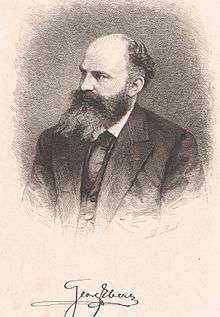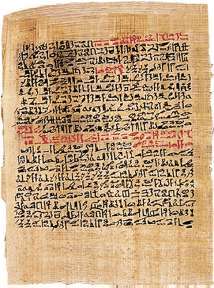Georg Ebers


Georg Moritz Ebers (Berlin, 1 March 1837 – Tutzing, Bavaria, 7 August 1898), German Egyptologist and novelist, discovered the Egyptian medical papyrus, of ca. 1550 BCE, named for him (see Ebers Papyrus) at Luxor (Thebes) in the winter of 1873–74. Now in the Library of the University of Leipzig, the Ebers Papyrus is among the most important ancient Egyptian medical papyri. It is one of two of the oldest preserved medical documents anywhere—the other being the Edwin Smith Papyrus (ca. 1600 BCE).
Life
At Göttingen he studied jurisprudence, and at Berlin Oriental languages and archaeology. Having made a special study of Egyptology, he became in 1865 Dozent in Egyptian language and antiquities at Jena, becoming professor in 1868. In 1870 he was appointed professor in these subjects at Leipzig. He had made two scientific journeys to Egypt, and his first work of importance, Ägypten und die Bücher Moses, appeared in 1867–1868. In 1874 he edited the celebrated medical papyrus (Papyrus Ebers) which he had discovered in Thebes (translation by H. Joachim, 1890).
Ebers early conceived the idea of popularizing Egyptian lore by means of historical romances. Eine ägyptische Königstochter was published in 1864 and obtained great success. His subsequent works of the same kind—Uarda (1877), Homo sum (1878), Die Schwestern (1880), Der Kaiser (1881), of which the scene is laid in Egypt at the time of Hadrian, Serapis (1885), Die Nilbraut (1887), and Kleopatra (1894), were also well received, and did much to make the public familiar with the discoveries of Egyptologists. Ebers also turned his attention to other fields of historical fiction—especially the 16th century (Die Frau Bürgermeisterin, 1882; Die Gred, 1887)—without, however, attaining the success of his Egyptian novels.
His other writings include a descriptive work on Egypt (Aegypten in Wort und Bild, 2nd ed., 1880); Palestine in Picture and Word (Palästina in Bild und Word), an 1884 translation of the English series Picturesque Palestine, Sinai, and Egypt; a life (1885) of his old teacher, the Egyptologist Karl Richard Lepsius; and a guide to Egypt (1886). In 1889, the state of his health led him to retire from his chair at Leipzig on a pension.
Ebers's Collected Works appeared in 25 volumes at Stuttgart (1893–1895). Many of his books have been translated into English. For his life, see his Die Geschichte meines Lebens (Stuttgart, 1893); also R. Gosche, G. Ebers, der Forscher und Dichter (2nd ed., Leipzig, 1887).
Notes
References


External links
| Wikisource has original works written by or about: Georg Ebers |
- Works by Georg Ebers at Project Gutenberg
- Works by Georg Moritz Ebers at Faded Page (Canada)
- Works by or about Georg Ebers at Internet Archive
- Works by Georg Ebers at LibriVox (public domain audiobooks)

